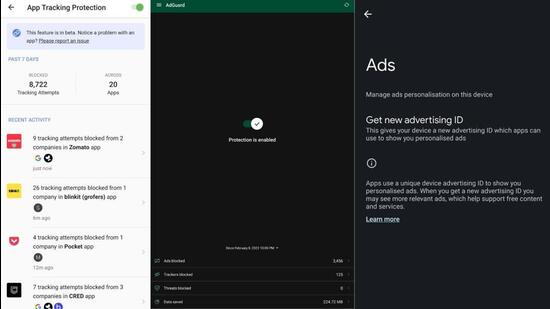Can you limit web trackers on Android, much before Google does it for you?
While Apple has given iPhone users the option to accept or deny tracking of apps, Android is yet to take a similar approach
Being tracked by apps has become a part of the collective consciousness ever since the conversation started early last year. In many ways, Apple stoked the fire when they decided to give iPhone users the choice of clamping down on apps that track their movements not just within, but on other apps as well. More users have begun to realise how much of their data was being tracked and collected, mostly without their permission, to serve advertisements.

Apple and Facebook (before their name changed to Meta) got into a war of words around the App Tracking Transparency feature early last year. Now, iPhone users have the choice to either allow apps to track them, or deny them, a framework that wasn’t available till now. There was pressure on Google to respond.
The new Android Privacy Sandbox, which Google is putting together (and it’ll take a while, mind you) wants to reduce tracking of user data, but wants to still keep ads in place. And that’s about it. This puzzle is yet to be pieced together. In the summer of 2021, Google talked about hiding advertising IDs if users don’t want to be tracked. While there was expectation of a stricter framework for Android phones, Google wants to keep advertisers onside too.
Also read: Google plans new Privacy Sandbox on Android, but it’s still a long way off
Your data, but without your permission
Web trackers that apps and platforms have used over the years to keep tabs on what you are browsing for, never really sought your permission or consent. If at all these measures were in place, the onus was on the user to find them placed deep within apps and settings. Most users didn’t know, or just didn’t bother to make the effort.
“Some websites not only store your user data, but also might sell it to advertising companies looking to target you with relevant products,” says security company Norton. They also point out that Facebook tracks about 15% of all web traffic, Amazon does that for around 17% of the web traffic, while Google tracks as much as 80% of all traffic that is online.
These trackers collect information about what you are browsing or shopping, services you’re accessing on the internet and which are your most visited websites. The simple mission — use that unique data to be able to serve you targeted ads, a billion-dollar industry, and growing fast still. They also collect this data for usage metrics, and monitor a website’s usability.
Apple gave iPhone users the option to accept or deny, a choice that should have been available across smart platforms a long time ago. Android doesn’t seem to take a similar approach yet.
A fine line between use and misuse
Why did we say ‘misuse’ earlier? Think about it — have most apps or web platforms asked for your permission to keep tabs on while you are window shopping for an e-commerce app, or which websites you visit regularly? No. Yet, on apps such as Facebook and Instagram, to name a few, ads for products you may wish to purchase were uncannily similar to something you were eyeing on a shopping website a few days (or in some cases, a few hours) ago.
How was that happening? It isn’t a coincidence. You’re being tracked without your permission, and that has evolved into a major data privacy question – how can data be collected?
“There are indeed a few causes for concern when it comes to data tracking, most of which regard to our data privacy and security and transparency surrounding where user data is stored and who has access to it. That’s because the more complacent we are about sharing our data, the farther our data is out of our hands,” says Norton’s security guidelines for web tracking.
Over the years, web browsers have included a “do not track” option, though websites often found their way around them. Yet, the problem is more rampant on smartphones, and across the apps you use on the phone. Is there a solution?
Apple’s App Tracking Transparency (ATT) feature presents users with prompts, listing the option to allow or block apps from tracking you. If you choose to block, those apps will not be able to follow you across other websites and apps. It is wide in its application, and locks down your data privacy effectively.
“Ad tracking cookies and other tools help companies determine which ads perform the best, as well as which ads to include in other digital and email marketing campaigns. While this is often incredibly convenient, it raises important questions about digital privacy,” says security firm AVG.
What can Android users do?
The problem is, Android, the smartphone platform used by billions globally, doesn’t have anything powerful to prevent apps from collecting your data to serve you advertisements you may not want, and neither will there be one in the foreseeable future. Android 12, which rolled out last year, allows users to delete their unique advertising ID to help throw trackers off your scent. Android 12 will also turn off access permissions for apps you haven’t used in a while. Yet, nothing that completely locks down tracking, the way iPhones can.
Android had clocked 71.09% share among smartphone operating systems, and as of May last year, had already clocked 3 billion users globally. That’s a lot of data for apps to collect. Third party apps come to the rescue.
DuckDuckGo shows the way forward
DuckDuckGo, a company best known for a privacy-focused search engine and web browser apps, has now rolled out an add-on for the DuckDuckGo Privacy Browser app for Android phones. Within the browser resides a very handy tool called App Tracking Protection for Android. It is similar in implementation to how Apple does trackers on iPhones.
DuckDuckGo says the App Tracking Protection for Android feature will work in the background, and block data-transfer requests from apps that you have disallowed from tracking you. It will also work when your phone is idle.
In our experience, DuckDuckGo regularly blocks between 8,000 to 10,000 tracking attempts across apps on an Android phone, including dozens of tracking attempts on apps that are used sporadically or remain dormant for a period of time. You can choose to manually disable the tracking prevention on specific apps – we chose not to, and haven’t noticed any broken functionality on any app, including web browsers, cloud storage and sync, messaging apps, social media and music streaming apps, for instance.
While the DuckDuckGo App’s ‘Tracking Protection’ feature is free to use, it is still in the beta phase. Not that it really is a problem, considering its prowess at blocking threats, but you may have to wait quite a while to get access – we got in the queue on two Android phones in November as soon as the feature was made available, and while one phone got access in December, the other still waits for its turn.
AdGuard is an alternative, worthy of your time
You shouldn’t trust just any app listed on the Google Play Store claiming to be your friend in blocking web trackers designed for ad delivery. Most of these are laced with malware and are malicious themselves. You can, however, try out AdGuard Ad Blocker – there is a free version with limited functionality and a paid version that costs around ₹59 per month (this will work on these devices – Android, iPhone, Windows PCs and Macs).
It starts off with a simple toggle to enable or disable this, but you’ll have a bunch of settings available, if that’s what you like. This will block trackers from accumulating data across the apps you use, and also has a built-in ad blocking feature that will reduce the annoyance that pop-ups, video adverts and banner ads tend to pose – in browsers and also within apps, though the latter can be a bit of a ‘hit and miss’, depending on apps.
Stay informed on Business News, TCS Q4 Results Live along with Gold Rates Today, India News and other related updates on Hindustan Times Website and APPs




